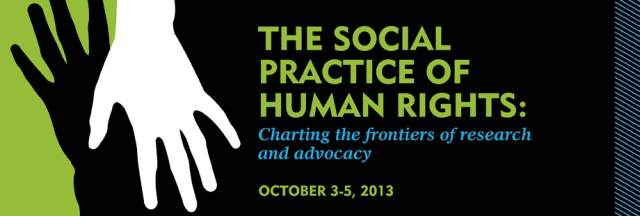Looking Forward: Documenting the Impact of ESC Violations
Location
River Campus - Room M2265
Start Date
10-4-2013 9:30 AM
Abstract
From the beginning of the modern human rights regime, the documentation of civil and political rights violations has been accompanied by the consideration of their effects on peoples’ lives. This nuanced understanding of rights violations and how they impacted peoples’ lives emanated from a collaborative process between human rights organizations and medical experts stemming from the early 1970s. Moreover, once violations had been confirmed, demonstrations of stress stemming from rights abuses emerged as a strategic advocacy tactic to achieve political will and social change. This practice has been pivotal for confirming the traumatic impact of acts like torture and bolstering calls for their abolition.
Despite this critical collaboration in documentation efforts, today we do not have the same thorough understanding or comprehension of the ramifications of economic, social and cultural (ESC) rights violation, nor do human rights activists evenly allege that ESC rights violations have a stressful (and lasting) impact on individuals.
Interestingly enough, there is a major body of evidence in the social sciences that contends that chronic ESC-related stressors are major indicators of peoples’ psychological distress. I contend that these sources of stress are the manifestations of ongoing ESC rights violations. Moreover, applying the findings from stress measures can be indicative of the impact of ESC rights violations.
I believe that demonstrations of stress, as proven successful with civil and political rights, may serve as a helpful tool in ESC documentation efforts. Further, such demonstrations may serve to illustrate the gravity of ESC rights violations and augment calls for social justice.
Looking Forward: Documenting the Impact of ESC Violations
River Campus - Room M2265
From the beginning of the modern human rights regime, the documentation of civil and political rights violations has been accompanied by the consideration of their effects on peoples’ lives. This nuanced understanding of rights violations and how they impacted peoples’ lives emanated from a collaborative process between human rights organizations and medical experts stemming from the early 1970s. Moreover, once violations had been confirmed, demonstrations of stress stemming from rights abuses emerged as a strategic advocacy tactic to achieve political will and social change. This practice has been pivotal for confirming the traumatic impact of acts like torture and bolstering calls for their abolition.
Despite this critical collaboration in documentation efforts, today we do not have the same thorough understanding or comprehension of the ramifications of economic, social and cultural (ESC) rights violation, nor do human rights activists evenly allege that ESC rights violations have a stressful (and lasting) impact on individuals.
Interestingly enough, there is a major body of evidence in the social sciences that contends that chronic ESC-related stressors are major indicators of peoples’ psychological distress. I contend that these sources of stress are the manifestations of ongoing ESC rights violations. Moreover, applying the findings from stress measures can be indicative of the impact of ESC rights violations.
I believe that demonstrations of stress, as proven successful with civil and political rights, may serve as a helpful tool in ESC documentation efforts. Further, such demonstrations may serve to illustrate the gravity of ESC rights violations and augment calls for social justice.




Comments
This biennial conference provides a unique space for scholars, practitioners and advocates to engage in collaboration, dialogue and critical analysis of human rights advocacy — locally and globally. Learn more about the Human Rights Center at the University of Dayton >>>.